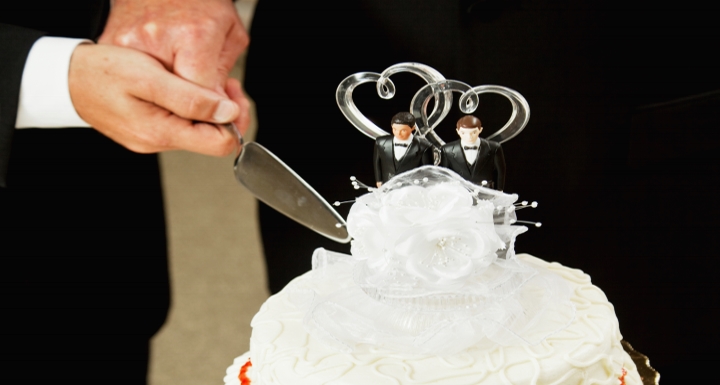News, Insights & Events
Supreme Court Update: Merchant Rights and the Masterpiece Cakeshop Case
June 6, 2018
Marla S. Bowman
Ward and Smith

In 2015, the United States Supreme Court issued its landmark decision in Obergefell v. Hodges, ruling that the Fourteenth Amendment precludes states from prohibiting the marriage of same-sex couples.
In the past three years since Obergefell, the Supreme Court has been relatively quiet on issues affecting the LGBTQ community. Recently, however, in Masterpiece Cakeshop, Ltd. v. Colorado Civil Rights Commission, a case of particular interest to the LGBTQ community, the Supreme Court ruled in favor of a Colorado baker who declined to bake and design a wedding cake for a gay couple, claiming to do so forced him to express a message inconsistent with his religious beliefs.
The State Case
The Colorado Civil Rights Commission ("Commission") determined that the baker's refusal violated Colorado's Anti-Discrimination Act ("Act"). The Act prohibits discrimination based on sexual orientation in places of public accommodation, such as bakeries engaging in sales to the public. While the Commission's ruling did not require the baker to bake a wedding cake for the complaining gay couple, it did require the baker to bake wedding cakes for future same-sex couples seeking his services.
The Supreme Court Decision
The baker appealed his case to the Supreme Court claiming that the Commission's ruling violated his rights under the United States Constitution's First Amendment and Free Exercise Clause. Justice Kennedy, the author of the majority opinion in which seven of the Court's nine Justices joined, determined that the baker's constitutional rights were violated, but not because Colorado's anti-discrimination law protecting same-sex couples was unconstitutional. Instead, the Court determined that the Commission was biased against the baker's religion and therefore failed to apply the Act in a manner that was neutral toward religion as required by the Free Exercise Clause.
The Court's finding that the Commission was biased relied heavily on the Commission's treatment of complaints from another individual after three bakeries refused to make him cakes containing expressions explicitly disapproving of same-sex marriage. The Commission determined that these bakeries' conscience-based objections to making cakes with disapproving messages were permissible, and the bakers did not have to bake cakes they found to be offensive. In its Masterpiece decision, the Court found that the Commission's treatment of these three bakeries' refusal was inconsistent with that of the Masterpiece baker who also declined to bake a cake he found to be offensive.
Concurring Opinions
Justice Kagan's concurring opinion highlights an important aspect of the majority ruling: the Commission's purported hostility toward the Masterpiece baker's religion resulted in the Court's finding that the Commission's ruling was unconstitutional, but had the Commission analyzed the baker's conduct in a religiously neutral manner, the Commission's ruling may have been found constitutional.
Justice Thomas's concurring opinion discusses an issue largely ignored by the majority opinion—whether the creation and design of a wedding cake is a form of expression protected by the First Amendment. Justice Thomas concluded that baking a cake under the circumstances presented in this case is a form of "expressive conduct" that can be protected by the First Amendment. While this concurrence has no binding effect on future rulings from the Court, jurisprudence concerning speech through conduct has been expanding in recent years.
Dissent
In her dissenting opinion, Justice Ginsburg opposed the conclusion that baking a cake is a form of protected expression, especially when the gay couple sought no specific message or any type of writing that would distinguish their cake from a wedding cake prepared for a heterosexual wedding. In contrast, the cakes the other bakeries declined to make included specific messages that opposed and disparaged gay marriage. In short, Justice Ginsburg would have found unconstitutional discrimination resulting from the couple being treated differently because they were gay, and she disagreed with the conclusion that a same-sex wedding cake sends a different message than that conveyed by a cake prepared for an opposite-sex wedding.
Conclusion
While Obergefell was a significant victory for the LGBTQ community, Masterpiece highlights an issue that has gone unchanged despite the legalization of gay marriage: discrimination based on sexual orientation is still not prohibited under federal law or that of many states, and many laws that do prohibit the unequal treatment of the LGBTQ community have not yet gone through the rigorous testing of similar laws that preclude discrimination based on race and gender.
Thus, Masterpiece likely is only the first in a series of cases that will establish the permissible boundaries of laws and rulings aimed at precluding discrimination based on sexual orientation. And in that sense, Masterpiece, given its narrow holding, is a modest start.
© 2018 Ward and Smith, P.A. For further information regarding the issues described above, please contact Marla S. Bowman.
